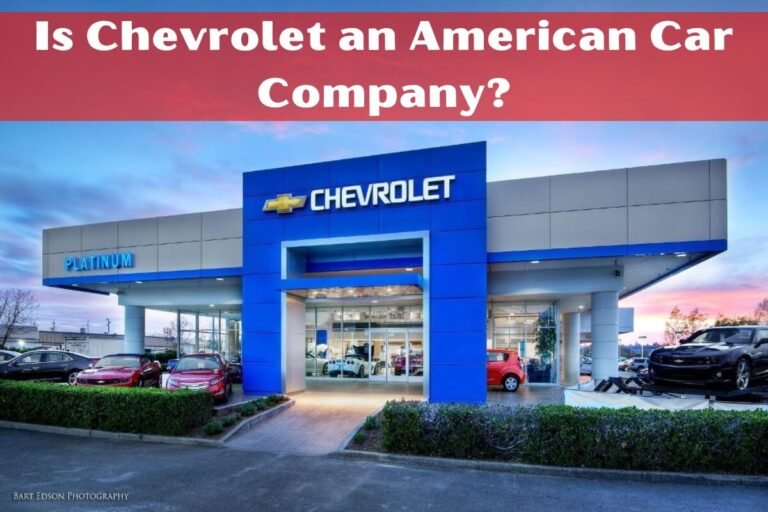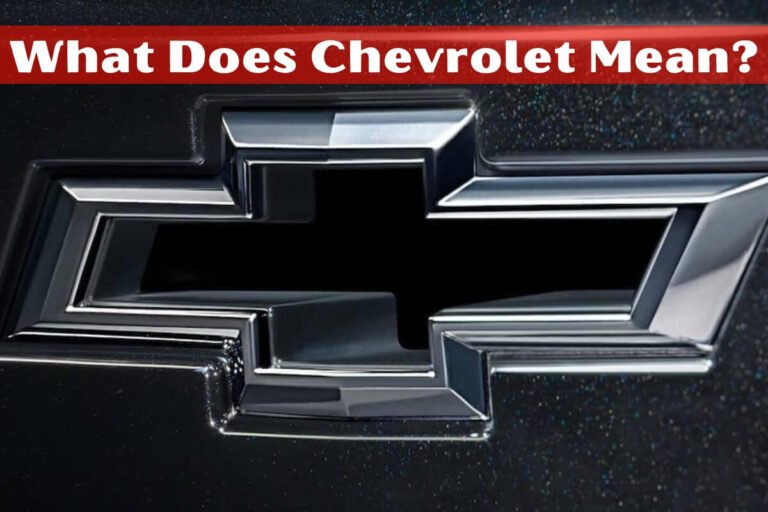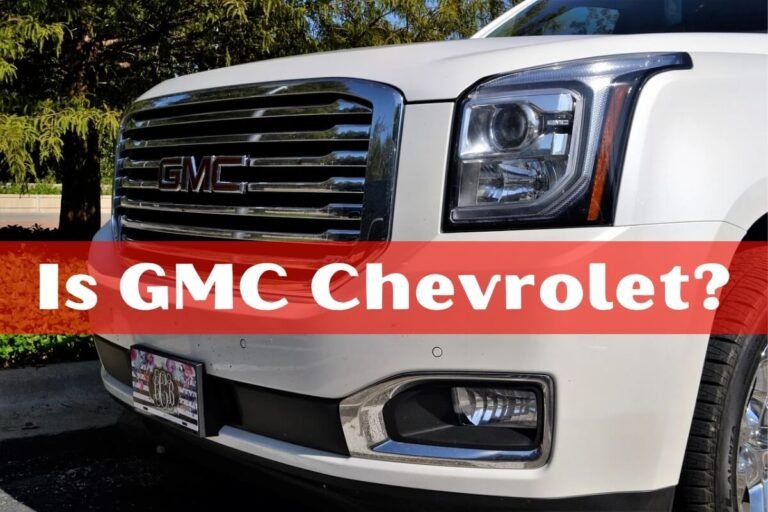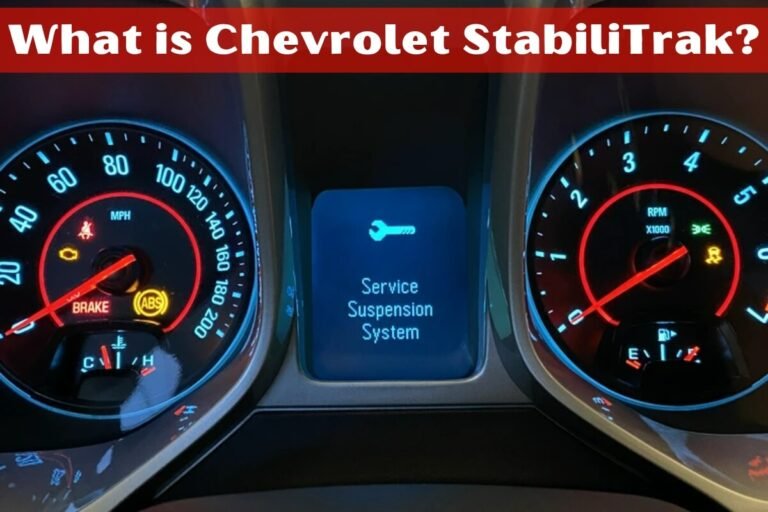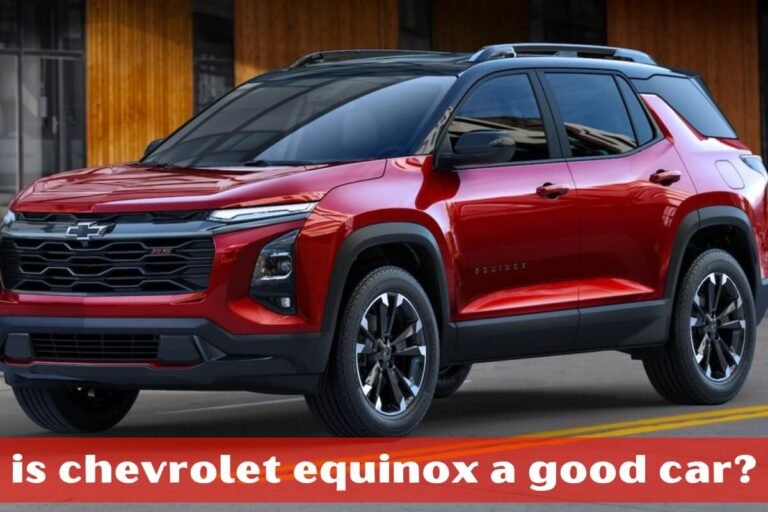Is Chevrolet a GM Brand? The Truth About Chevy’s Ownership
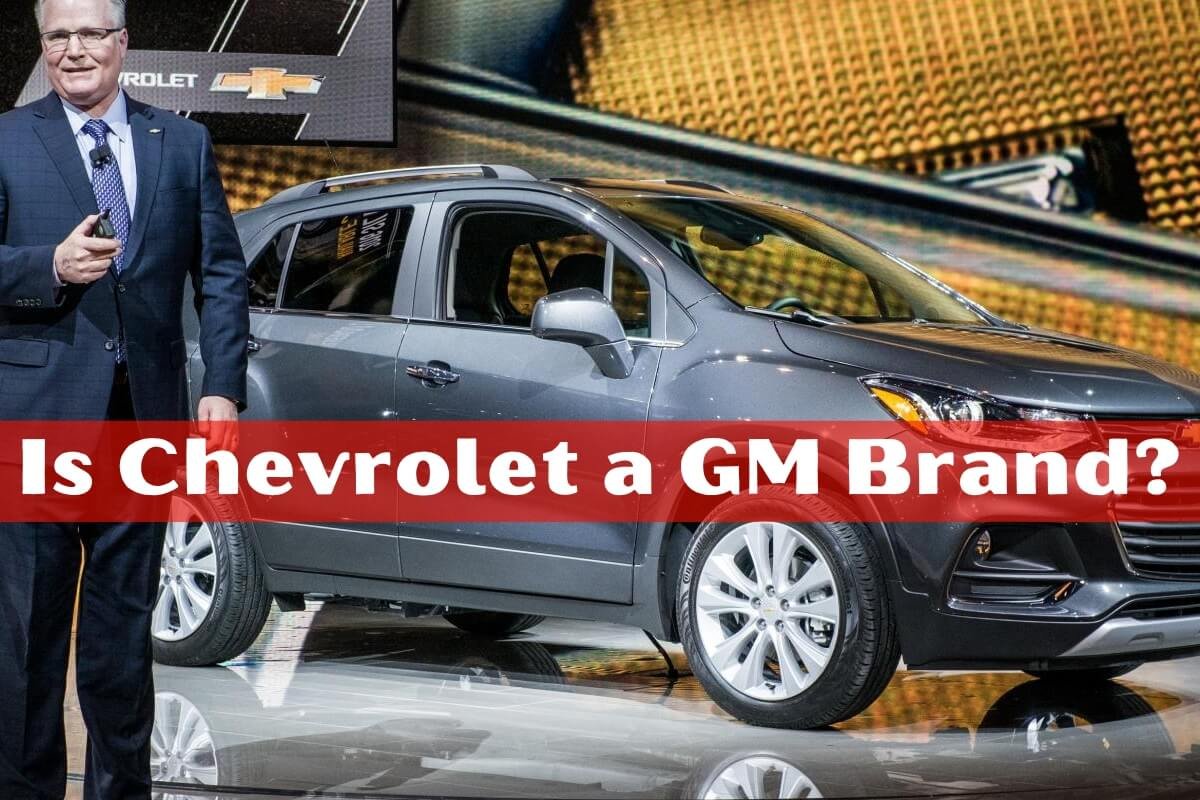
Few automotive brands have captured the hearts and minds of Americans quite like Chevrolet. With its signature “bowtie” emblem and a lineup that ranges from practical sedans to brawny pickups to performance icons like the Corvette, Chevy has become deeply woven into the fabric of our driving culture.
But despite its ubiquity on roads across the nation, there’s often confusion surrounding this legendary marque. Is Chevrolet its own independent automaker? Or is it part of a larger automotive group? The answer, in bold, is Yes, Chevrolet (commonly referred to as Chevy) is a brand owned by General Motors (GM), one of the world’s largest automobile manufacturers.
Learn about the connection between Chevrolet and its parent company GM. We’ll look at their shared history, Chevy’s role in GM’s brand lineup, and the pros and cons of being part of a huge automotive company. From classic Chevy models to future product plans, we’ll cover it all to help you understand the relationship between Chevy and GM.
A Brief History of Chevrolet and General Motors
To properly understand Chevrolet’s ties to GM, we need to go back to the very beginning. The Chevrolet story dates back to 1911, when renowned race car driver Louis Chevrolet teamed up with William C. Durant to launch the Chevrolet Motor Car Company in Detroit.
The partnership was a winning combination – Chevrolet brought credibility and racing pedigree, while Durant provided the business acumen and vision. Their first car, the Chevrolet Series C Classic Six, proved to be an instant hit thanks to its modern design and powerful 6-cylinder engine.
However, just a few years later in 1918, a financially struggling Chevrolet company was acquired by Durant’s other firm – General Motors. At the time, GM was a fledgling conglomerate that Durant had founded over a decade earlier by merging several leading automakers like Buick, Oldsmobile, Cadillac, and more.
Under GM’s umbrella and with Durant back at the helm, Chevrolet was re-energized and quickly became the volume leader of the corporation’s multi-brand strategy. Its ability to deliver well-engineered, value-packed vehicles to the masses cemented Chevy’s place as GM’s most popular and important brand for decades to come.
The General Motors Umbrella – Chevrolet and Its Sibling Brands
Today, General Motors is a true automotive juggernaut, with operations spanning the globe and a portfolio of brands that cater to virtually every customer segment imaginable. And at the core of this empire lies Chevrolet, GM’s flagship mainstream brand and volume sales leader.
But Chevy isn’t the only brand under GM’s umbrella. The company’s lineup also includes iconic American marques like:
- Buick – GM’s pseudo-luxury brand positioned just above Chevrolet, known for upscale sedans and SUVs.
- Cadillac – The company’s true premium/luxury division which competes with European and Japanese luxury makes.
- GMC – A truck/SUV brand very closely aligned with Chevrolet, offering professional-grade models like the Sierra pickup.
While these brands operate independently with their own distinct identities and product offerings, they are all fully owned and controlled by General Motors. This setup allows GM to have a presence across multiple market segments without its brands cannibalizing each other’s sales.
What Cars and Vehicles Does Chevrolet Make?
As GM’s mainstream volume brand in the United States, Chevrolet offers one of the broadest and most diverse product portfolios of any automaker. From compact cars to full-size pickups and everything in between, Chevy truly has a vehicle for every need and every buyer.
Some of the most popular and iconic Chevrolet models today include:
- Chevrolet Silverado – Chevy’s half-ton full-size pickup truck, perennially one of the best selling vehicles in America alongside its cross-town rival the Ford F-150.
- Chevrolet Corvette – An American supercar legacy dating back to 1953, with the current C8 generation moving to a revolutionary mid-engine layout.
- Chevrolet Camaro – A classic American muscle/pony car, the Camaro brings bold styling and performance to take on the Ford Mustang.
- Chevrolet Equinox/Traverse – Chevrolet’s compact and mid-size SUV offerings to satisfy America’s endless craving for utility vehicles.
- Chevrolet Bolt EV/EUV – Chevy’s pioneering all-electric vehicles, helping drive GM’s “zero crashes, zero emissions” vision for the future of mobility.
Is the Chevy Bolt a GM Car?
Speaking of electric vehicles, the Chevrolet Bolt EV is one of GM’s biggest bets in the transition towards sustainable electrified transportation. But given its cutting-edge tech and avant-garde styling, some may wonder if this innovative hatchback was actually developed by GM or an outside firm.
The answer is clear: The Chevy Bolt EV is 100% designed, engineered, and manufactured by General Motors. In fact, the Bolt kicked off GM’s scalable Ultium electric platform that will underpin a full lineup of EVs across the Chevrolet, Cadillac, GMC, and Buick brands in the coming years.
So while the Bolt may seem like a departure from traditional Chevy vehicles, it is very much a GM product through-and-through, leveraging the full technological might and expertise of General Motors. This fact should provide reassurance to any prospective Bolt buyers about the car’s pedigree and long-term support from a major global automaker.
The Benefits of Being a GM Brand
For Chevrolet, being fully owned and operated by GM brings a numerous benefits and advantages that translate directly to the vehicles they sell to customers. Some of the key perks include:
Vast resources and economies of scale – As one of the largest automakers on the planet, GM’s incredible financial resources, manufacturing scale, and global footprint provide Chevrolet access to cutting-edge technologies, top engineering talent, and the ability to bring new vehicles to market quickly yet cost-effectively.
Shared platforms and components – GM’s brand portfolio strategy means Chevrolet models often share core platform architectures, engine families, transmissions, and other key components with corporate siblings like Buick, Cadillac, and GMC. This reduces development costs through economies of scale.
Manufacturing expertise – Chevy vehicles are built at GM’s cutting-edge manufacturing facilities by a highly skilled workforce, following the corporation’s stringent quality control and testing regimens. This level of process discipline is a hallmark of all GM brands.
Global reach – Through GM’s presence in multiple markets worldwide, Chevrolet is able to distribute and provide support for its vehicles across dozens of countries. Buyers can purchase Chevy models almost anywhere with confidence they’ll be supported.
How Does Chevrolet Compare to Other GM Brands?
While leveraging GM’s breadth of resources is an advantage, the company takes great care to ensure its brands have a clear, differentiated identity and positioning within its portfolio. For Chevrolet, that means occupying the mainstream high-volume brand space.
In general, Chevy models tend to be more affordable and mainstream-oriented compared to their Buick, Cadillac and GMC counterparts. The pricing and features line up like this:
- Chevrolet – Mainstream pricing and features for the mass market
- Buick – Slightly elevated, near-luxury positioning and pricing
- GMC – Professional grade trucks/SUVs, typically aligning with Buick pricingbut with a more rugged/capable positioning
- Cadillac – True premium luxury pricing and features to compete with European/Japanese luxury brands
However, there is some product overlap between the brands based on shared platforms. For example, the Chevrolet Silverado and GMC Sierra are both highly-capable full-size trucks built in the same GM factories. But the Sierra models are typically positioned as more premium and come with more standard features/luxury options to differentiate it from the mainstream Silverado.
GM carefully controls each brand’s go-to-market strategy and product cadence to maintain proper separation and pricing disciplines between them. So while a Chevrolet may share some DNA with a Cadillac under the skin, the two are clearly differentiated to avoid internal competition.
This separation allows GM to offer a wide range of vehicles at multiple price points without its brands stepping on each other’s toes. It’s a delicate balancing act that GM has refined over decades of experience managing its multi-brand portfolio.
Debunking Common Myths About Chevrolet’s Ownership
Despite Chevrolet’s clear affiliation with GM being well-established, there are still some persistent myths and misconceptions about the brand’s ownership and corporate ties. Let’s take a moment to clear a few of those up:
Myth: Chevrolet is an independent, separate company from GM. This is definitively false. Chevrolet has been a wholly-owned subsidiary brand of General Motors since 1918 when GM acquired the company during its early years. Chevy is not an independent entity, but rather just one brand under GM’s corporate umbrella.
Myth: GM has minimal influence over Chevrolet’s product design and engineering. While Chevrolet does have its own dedicated design and engineering teams, the brand operates fully under GM’s corporate organizational structure. All major product decisions, designs, and core engineering work is heavily influenced and approved by GM’s corporate leadership. Chevy relies on shared GM resources and components for its vehicles.
Myth: Chevrolet predates or originated separately from General Motors.
Not true – GM was founded in 1908, while the Chevrolet company wasn’t established until 1911. And just a few years after that in 1918, an already struggling Chevrolet was brought under GM’s control, where it has remained ever since as one of GM’s crown jewel brands.
The Role of GM in Chevrolet’s Future
Looking ahead, it’s clear that Chevrolet’s future product strategy and technological development will be driven by its parent company GM. A few key areas where GM’s involvement will shape Chevy’s road ahead:
Electrification – GM’s new Ultium platform and batteries will underpin virtually all of Chevy’s upcoming EVs like the Silverado EV, Equinox EV and more. The technologies enabling Chevy’s electric future are 100% bred from GM.
Autonomous driving – Chevy will be one of the key brands spearheading GM’s efforts around self-driving cars through advanced systems like Super Cruise. GM’s autonomous vehicle subsidiary Cruise will work hand-in-hand with Chevy.
Connected services – Features like in-vehicle connectivity, over-the-air updates, and subscription services will all be orchestrated at the GM corporate level and deployed across brands like Chevrolet.
New segments/products – Any major new vehicle segments or product lines that Chevrolet may venture into, whether it’s performance cars or commercial vehicles, will likely be offshoots or derivatives of other products/platforms already being developed within GM’s broader portfolio.
GM is setting the technology roadmap and product narratives that Chevrolet and its other brands will follow. The parent company’s capital allocation and strategic priorities will dictate much of what innovative new vehicles and services end up wearing the iconic Chevrolet “bowtie” badge in the years ahead.
Why Consumers Should Care About Chevrolet Being a GM Brand
At this point, the direct connection between Chevrolet and its parent automaker GM should be clear as day. But why does this matter for consumers? What advantages does a GM-backed brand like Chevy offer buyers?
Proven expertise and heritage – Chevrolet’s over 100-year history operating within the pioneering and accomplished GM corporation provides reassurance that the brand has consistently met the highest standards for engineering, quality, durability and performance expected of a major global automaker. You’re getting a product backed by over a century of automotive manufacturing excellence.
World-class customer support and services – As a GM brand, Chevrolet customers gain access to the company’s vast network of dealers, certified service centers, roadside assistance services, and more across the United States (and globe). If any issues arise with your Chevy vehicle, you can rest assured expert GM-trained professionals and resources are there to support you.
Long-term reliability and support – Let’s face it – major automakers like GM aren’t going anywhere anytime soon. Chevrolet’s trucks, SUVs, and cars will continue to be supported with parts, warranty coverage, and repair expertise from GM’s manufacturing operations for decades to come. That internalized long-term support provides added peace of mind for the lifespan of your vehicle.
Potential resale value benefits – Used car buyers know and trust powerhouse brands like Chevrolet that are affiliated with the big names in the automotive world like GM. So when it comes time to sell your Chevy down the road, the close ties to an established company like GM could help buoy resale values.
So while brand loyalty and personal preferences are major factors for most car buyers, those considering a Chevrolet purchase should feel confident that they’re getting a quality, thoroughly engineered, and professionally-supported product thanks to the might of GM behind the brand.
In Summary
The evidence is clear – Chevrolet is undoubtedly a brand owned and operated by General Motors, the largest automaker in the United States and one of the true giants of the global automotive industry.
From its acquisition by GM in the early 20th century to its current positioning as GM’s mainstream high-volume brand, Chevrolet has been an integral part of the GM family for over 100 years. While the brand maintains a distinct identity and product lineup tailored for its target customer base, virtually every aspect of Chevrolet – from design and engineering to manufacturing and support – is directly influenced by or tied into GM’s broader organizational structure and capabilities.
For consumers, this GM connection brings numerous advantages and benefits that buyers of other non-GM brands may not enjoy. GM’s vast resources allow Chevrolet to deliver cutting-edge technologies, properly engineered and tested products, and long-term support that only a major global automaker can provide.
So whether you’re a loyal Chevy fan or simply a prospective buyer doing your research, understanding Chevrolet’s indelible ties to its parent General Motors provides valuable insight and extra confidence when it comes time to purchase. The iconic Bowtie brand may maintain an individual persona, but it has the full might and expertise of GM propelling it into the future.


